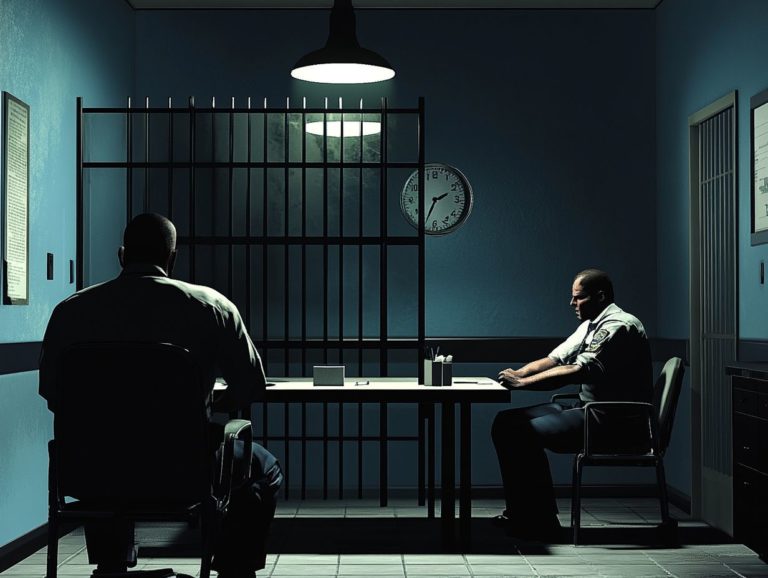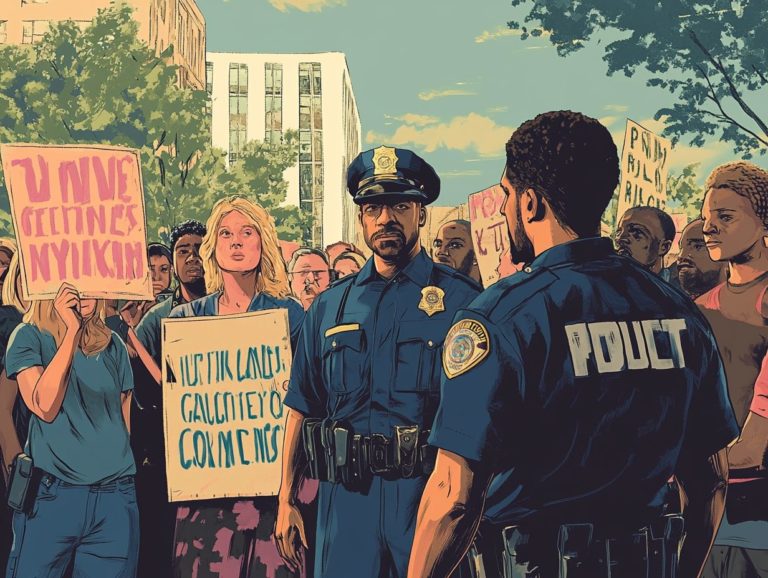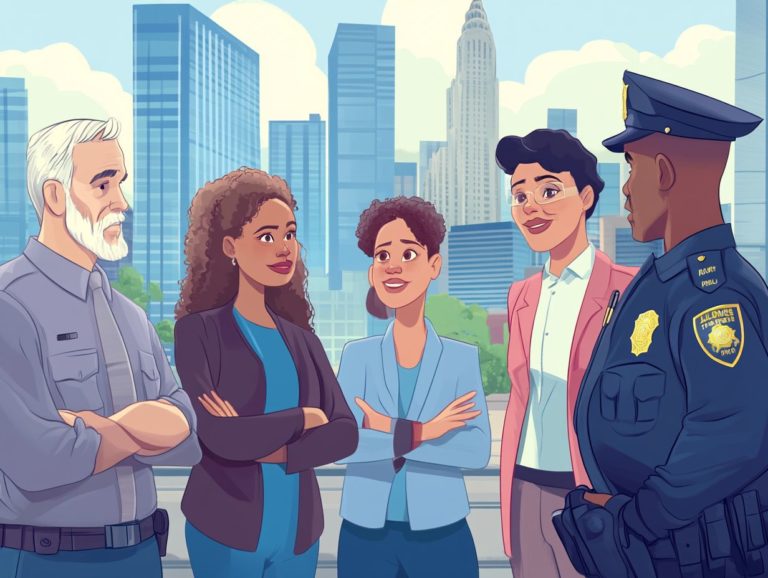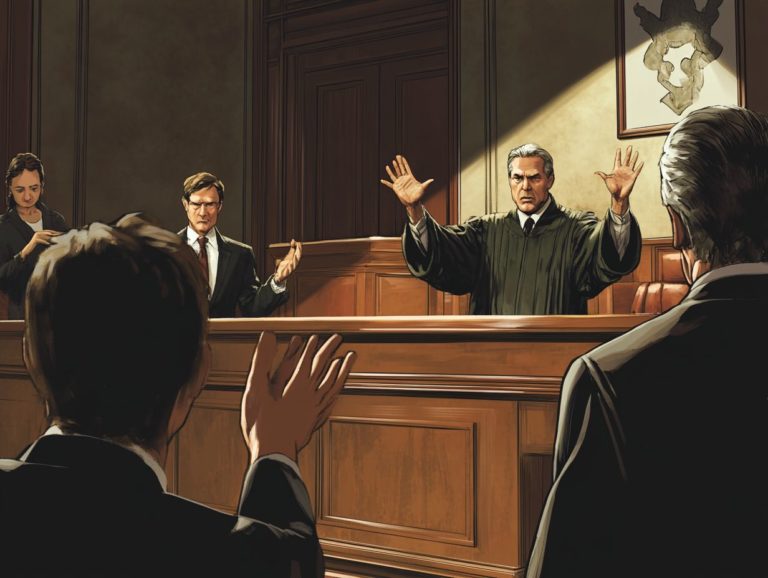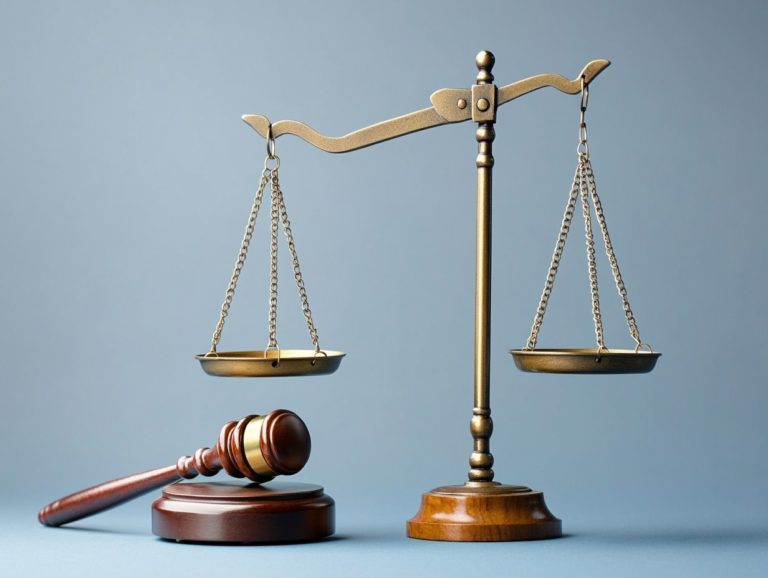Rights of the Accused: Historical Context
The rights of the accused have undergone a remarkable transformation over the course of history, reflecting evolving perspectives on justice and individual freedoms.
From their origins in ancient civilizations to the significant shifts during medieval times and the Enlightenment, each period has played a vital role in shaping the framework we recognize today. This exploration covers key legal documents and landmark cases that have defined modern interpretations of these rights, while also tackling contemporary controversies that test the balance between individual rights and community safety.
Let’s look ahead to see how these rights might change and innovate to redefine the landscape for the accused. Embark on this journey through time to gain a deeper understanding of the foundations and future of justice for those facing accusations.
Contents
- Key Takeaways:
- History of the Rights of the Accused
- Modern Interpretations of Rights of the Accused
- Current Controversies and Challenges
- Impact of Technology on Accused Rights
- Future of Accused Rights
- Predictions and Potential Changes
- Frequently Asked Questions
- What is the historical context of the rights of the accused?
- How did the Magna Carta influence the rights of the accused?
- When did the right to an attorney for the accused become a part of the legal system?
- How did the Enlightenment period impact the rights of the accused?
- What role did the Geneva Conventions play in the rights of the accused?
- How have civil rights movements impacted the rights of the accused?
Key Takeaways:
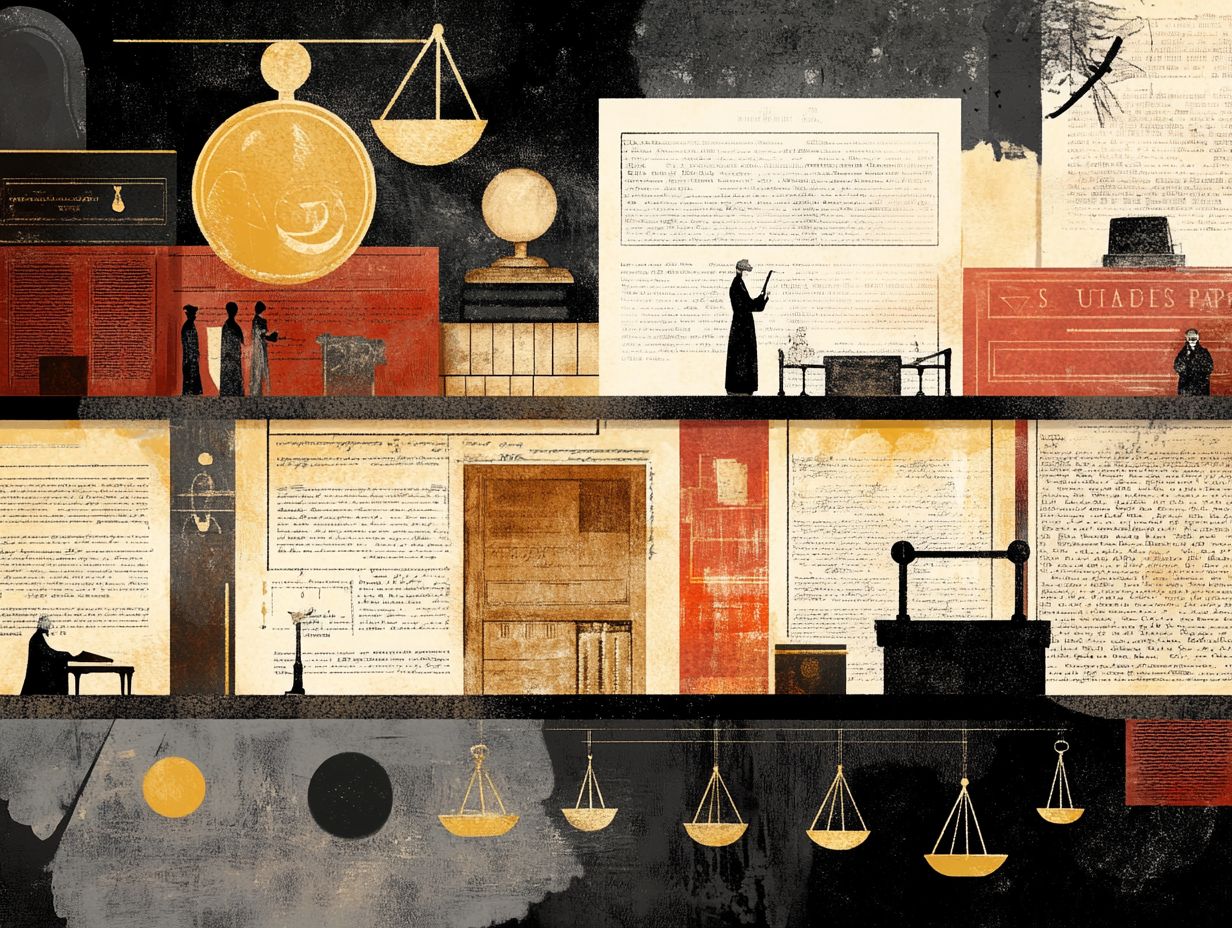
The rights of the accused have a long history that dates back to ancient civilizations and has been shaped by various influences, including the Enlightenment. Modern interpretations of the rights of the accused are informed by key legal documents and cases, which have led to the establishment of important principles and protections.
Balancing the rights of the accused with public safety is urgent and needs our attention now. The impact of technology on these rights and potential future changes in this area remain topics of debate and prediction.
History of the Rights of the Accused
The history of the rights of the accused is intricately woven into the fabric of legal systems, starting with ancient civilizations that acknowledged the necessity of fair trials and legal representation.
Over the centuries, these principles have undergone significant transformation, shaped by landmark documents such as the Magna Carta and crucial cases like Gideon v. Wainwright and Powell v. Alabama.
In today s world, these rights capture the very essence of justice and due process within modern judicial systems, guaranteeing that every individual is afforded a fair trial, access to legal counsel, and protection against unreasonable searches all essential components of a just society.
Origins in Ancient Civilizations
The origins of the rights of the accused can be traced back to ancient civilizations, where the concept of a fair trial began to take shape through various legal codes and practices, much like those outlined in the top 5 rights of the accused explained.
In Mesopotamia, the Code of Hammurabi laid down foundational principles for ensuring justice, emphasizing the importance of evidence and the role of impartial judges.
As you explore ancient Greece, you’ll find democratic ideals manifesting in public trials, allowing citizens to present their cases openly and witness the proceedings. This underscores the value placed on transparency and accountability.
These early legal frameworks not only recognized the legal rights of the accused but also highlighted the necessity of impartiality and reasoned judgment elements that have profoundly influenced contemporary human rights practices and legal systems across the globe.
How Medieval Times Shaped Rights
During medieval times, our understanding of the rights of the accused was profoundly shaped by monumental events like the signing of the Magna Carta. This pivotal document laid the foundation for limiting royal interference in legal matters.
It introduced essential legal principles that have echoed through the ages, nurturing a legal system where one could rightly expect fair treatment. The emphasis on public trials and the right to a jury represented a significant shift in judicial practices.
Decisions no longer rested solely in the hands of a monarch or a privileged few; instead, the involvement of ordinary citizens in the judiciary began to take form. As this transformation unfolded, the growing recognition of the need for legal protections for the accused became evident, establishing a standard that demanded transparency and accountability within the justice system.
To learn more about your rights or to get involved in advocacy, consider exploring resources available on this important topic.
Influence of the Enlightenment

The Enlightenment played a pivotal role in shaping contemporary legal rights for accused individuals, emphasizing reason, individual rights, and the necessity of a fair trial.
This intellectual movement championed the principle that everyone deserves the right to a defense. The thinkers of that era ignited ideas that would evolve into crucial legal protections.
These Enlightenment ideals are clearly reflected in the establishment of the Sixth Amendment in the United States, which guarantees rights as a criminal defendant, particularly the right to counsel.
Landmark cases such as Gideon v. Wainwright and Powell v. Alabama further solidified these protections. They showcase how modern legal systems resonate with Enlightenment concepts by ensuring that justice remains accessible and equitable, regardless of circumstances.
Modern Interpretations of Rights of the Accused
Modern interpretations of the rights of the accused are firmly rooted in the principles set forth by the Sixth Amendment. This critical amendment guarantees the right to a fair trial, access to legal counsel, and an impartial jury, ensuring rights are upheld throughout the judicial process.
Key Legal Documents and Cases
Key legal documents and landmark cases, such as the Sixth Amendment, Gideon v. Wainwright, and Powell v. Alabama, hold significant importance in defining and safeguarding rights as an accused individual.
These pivotal decisions and constitutional provisions highlight the crucial need for legal representation when facing criminal charges. This ensures that defendants do not face disadvantages in a system that often leans toward the prosecution.
By asserting the right to an impartial jury, these legal standards help ensure that the trial process remains fair a cornerstone of justice. The implications of the Miranda warning serve as a vital reminder of the right to remain silent and seek legal counsel during interrogations.
Together, these elements create a protective framework that champions individual rights while upholding the integrity of the judicial system as a whole.
Current Controversies and Challenges
Current controversies and challenges regarding the rights of the accused frequently stem from the challenge of balancing these rights with public safety concerns.
This delicate interplay gives rise to heated debates on issues such as double jeopardy, the rule that prevents someone from being tried twice for the same crime, and unreasonable searches. Navigating this landscape requires a nuanced understanding of both legal principles and societal expectations.
Balancing Rights with Public Safety
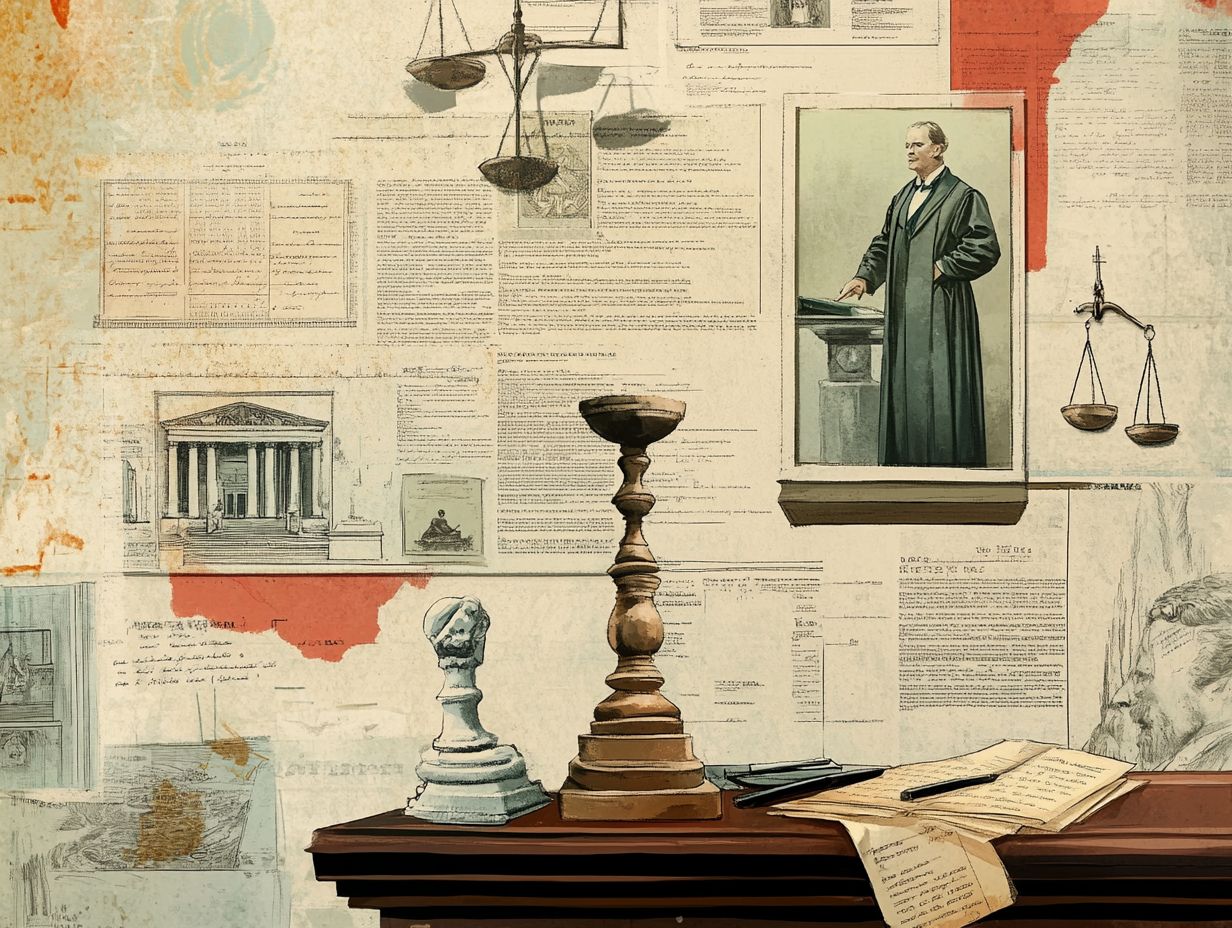
Balancing the rights of the accused with public safety is a complex and often contentious issue in criminal justice. This frequently prompts legal reforms and policy shifts.
This delicate equilibrium requires consideration of various factors, such as community safety, pretrial detention, and reasonable bail provisions.
Legal reforms strive to create an environment where public confidence in the justice system can coexist with the fundamental rights granted to individuals accused of crimes.
As a policymaker, grappling with pivotal questions about the effectiveness of diversion programs and the impact of excessive bail amounts on marginalized communities is essential. The overarching need for equitable treatment is crucial.
All the while, potential ramifications for the legal system as a whole must be addressed, including the risk of wrongful convictions and the perpetuation of systemic inequalities.
Impact of Technology on Accused Rights
Technology significantly impacts the rights of the accused. This raises urgent questions about privacy, electronic eavesdropping, and legal rights.
As new surveillance technologies emerge, the balance between national security and individual freedoms grows precarious. Issues such as drone monitoring, access to personal data via smartphones, and facial recognition software present fresh challenges to due process.
For individuals facing charges, the right to a fair trial could be at risk due to the widespread use of these technologies. This could lead to biased outcomes. Legal experts and civil rights advocates share concerns, highlighting how these advancements complicate traditional legal frameworks. They also foster a societal climate where the presumption of innocence might be overshadowed by an ever-watchful digital eye.
Future of Accused Rights
The future of the rights of the accused rests on the continuous evolution of legal reforms. These reforms are designed to tackle emerging challenges in our swiftly changing societal landscape.
This evolution is crucial, especially in realms like digital privacy and the upholding of fair trial standards.
Predictions and Potential Changes
Predictions regarding the future of the rights of the accused indicate that significant changes may be on the horizon. Society is grappling with emerging legal and ethical challenges.
This evolving landscape may prompt a reevaluation of existing legal frameworks. Such changes are driven by growing public demand for fair treatment and accountability within the justice system.
As communities rally for reform, policymakers may increasingly prioritize protections that balance the rights of the accused with public safety imperatives.
Shifting perceptions around mental health and restorative justice could influence how legal interpretations are approached, especially in cases involving marginalized groups.
These changes could redefine accountability and reshape justice as we know it. They may establish new standards for oversight and fairness in both legal proceedings and their outcomes.
Frequently Asked Questions

What is the historical context of the rights of the accused?
The concept of rights of the accused can be traced back to ancient civilizations such as Greece and Rome. These systems were established to protect individuals from unfair accusations and punishments.
How did the Magna Carta influence the rights of the accused?
The Magna Carta, signed in 1215, established the principle of due process. It also affirmed the right to a fair trial for the accused. This document laid the groundwork for modern legal systems and greatly influenced the development of rights for the accused.
When did the right to an attorney for the accused become a part of the legal system?
The right to an attorney for the accused was established in the 6th Amendment of the United States Constitution in 1791. This right was later expanded to include the right to legal counsel for all criminal defendants in the famous Supreme Court case, Gideon v. Wainwright, in 1963.
How did the Enlightenment period impact the rights of the accused?
The Enlightenment period, which took place in the 18th century, brought about new ideas of individual rights. It emphasized the importance of a fair and just legal system. This led to the development of the presumption of innocence, stating that an accused individual is innocent until proven guilty.
What role did the Geneva Conventions play in the rights of the accused?
The Geneva Conventions, first established in 1864, outlined the rights of prisoners of war. They protected them from unjust treatment. This greatly influenced the development of rights for accused individuals in both domestic and international legal systems.
How have civil rights movements impacted the rights of the accused?
The civil rights movements of the 20th century, such as the women’s rights and civil rights movements, brought attention to inequalities and injustices within the legal system. This led to new laws and policies aimed at protecting the rights of the accused, particularly for minority groups.

